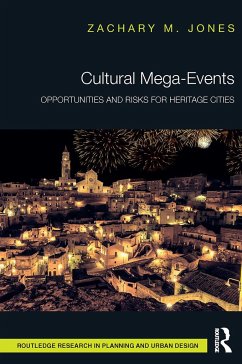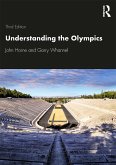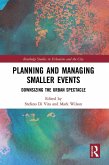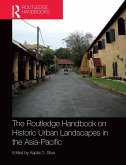Mega-events have long been used by cities as a strategy to secure global recognition and attract future economic investment. However, while cultural mega-events like the European Capital of Culture have become increasingly popular, cities have begun questioning the traditional model of other events such as the Olympic Games with many candidate cities cancelling bids in recent years. This approach to planning and developing cities through mega-events introduces a broad range of physical effects and nuanced institutional changes for cities, particularly for the more sensitive heritage areas of cities. This book explores these issues by first examining the dynamics of cities' attempts to reduce overall costs and increase the sustainability of these large events by further embedding them within the existing fabric of the city and second by studying in depth the impact on the heritage of host cities. This book investigates three World Heritage Cities: Genoa, Liverpool and Istanbul, each of which have hosted the European Capital of Culture and introduced a variety of opportunities and risks for their heritage. The book highlights the potential benefits and challenges of integrating event and heritage planning to provide lessons that can help future historic cities and heritage decision makers better prepare for such events.
"A timely and well researched investigation of the rise of cultural mega-events within urban agendas, and of the opportunities and threats such events raise in heritage-rich European cities. The book reflects on experiences from the UK, Italy and Turkey and will be of interest to researchers, heritage experts, mega-event promoters and policy makers." - Franco Bianchini, Professor of Cultural Policy and Planning, Director of Culture, Place and Policy Institute (CPPI), University of Hull
"Zachary Jones discloses an innovative perspective not only on cultural mega-events but also on their relationship with cultural heritage and what urban planning and policy can do with it. His book provides the readers with solid evidence and it envisions new paths for mega-event and heritage research and planning." - Davide Ponzini, Associate Professor of Urban Planning, Politecnico di Milano
"Zachary Jones presents a diligently researched and clearly written analysis of an important new phenomenon - the cultural mega-event - and its contributions to urban development and heritage globally. His carefully framed spatial stories support analyses of the political and economic drivers of these events (Olympics, expos, cultural capitals) and foreground their substantial long-term effects. This book makes significant contributions to the literature on heritage, urban design and development, and placemaking."- Randall Mason, Associate Professor, Stuart Weitzman School of Design, University of Pennsylvania
"Despite the clear potential for synergies and tensions to arise between cultural mega-events and the stewardship of built heritage, there has so far been a paucity of conceptually informed and empirically rich research on these issues. This book clearly addresses this gap in the state of our current knowledge by addressing how the hosting of such events may in some contexts be used as an opportunity to foster certain heritage objectives, whilst in others heritage may be a less central concern, or even be marginalised as something of a 'poor relation' in the wider cultural mega-event planning and hosting process. The book combines conceptual insights on these issues with engaging accounts of three emblematic cases of cities which have hosted the European Capital of Culture title - Genoa, Liverpool and Istanbul, to provide recommendations to decision makers on how to maximise the opportunities and minimise the threats presented by mega-events to heritage. It also provides a novel academic framework which can be used to elucidate these issues and in so doing significantly advances the present debate and scope for further research in the field." -- Olivier Sykes, Department of Geography and Planning, University of Liverpool
"Zachary Jones discloses an innovative perspective not only on cultural mega-events but also on their relationship with cultural heritage and what urban planning and policy can do with it. His book provides the readers with solid evidence and it envisions new paths for mega-event and heritage research and planning." - Davide Ponzini, Associate Professor of Urban Planning, Politecnico di Milano
"Zachary Jones presents a diligently researched and clearly written analysis of an important new phenomenon - the cultural mega-event - and its contributions to urban development and heritage globally. His carefully framed spatial stories support analyses of the political and economic drivers of these events (Olympics, expos, cultural capitals) and foreground their substantial long-term effects. This book makes significant contributions to the literature on heritage, urban design and development, and placemaking."- Randall Mason, Associate Professor, Stuart Weitzman School of Design, University of Pennsylvania
"Despite the clear potential for synergies and tensions to arise between cultural mega-events and the stewardship of built heritage, there has so far been a paucity of conceptually informed and empirically rich research on these issues. This book clearly addresses this gap in the state of our current knowledge by addressing how the hosting of such events may in some contexts be used as an opportunity to foster certain heritage objectives, whilst in others heritage may be a less central concern, or even be marginalised as something of a 'poor relation' in the wider cultural mega-event planning and hosting process. The book combines conceptual insights on these issues with engaging accounts of three emblematic cases of cities which have hosted the European Capital of Culture title - Genoa, Liverpool and Istanbul, to provide recommendations to decision makers on how to maximise the opportunities and minimise the threats presented by mega-events to heritage. It also provides a novel academic framework which can be used to elucidate these issues and in so doing significantly advances the present debate and scope for further research in the field." -- Olivier Sykes, Department of Geography and Planning, University of Liverpool








